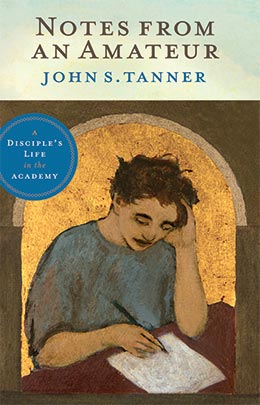Research Loads
John S. Tanner, Notes from an Ameteur: A Disciple’s Life in the Academy (Provo, UT: Religious Studies Center; Salt Lake City: Deseret Book, 2011), 71–3.
We often talk in the academy of “teaching loads.” What an odious phrase! It brings to my mind the figure of Christian in Pilgrim’s Progress [1] weighed down with a burden of sin on his back. Or of a slave sweating under a load laden on him by a cruel taskmaster. To speak of our core faculty responsibility in such terms is to invite us to imagine teaching as drudgery and ourselves as drudges condemned to a burdensome life in some educational salt mine. I wish we could get rid of this phrase altogether. Whenever possible, I try to substitute the phrase “teaching assignment” for “teaching load.”
Nevertheless, I recognize that the term “teaching load” is not going to disappear anytime soon. It is too deeply embedded in academic discourse at BYU and elsewhere. Given this, how then should we describe our research responsibilities? If we have something called a “teaching load,” then mutatis mutandis we also have a “research load,” even though it is rarely spoken of in this way. Instead we speak of “research time” or “released time for research,” as if teaching constituted the dues we pay for time to engage in scholarly and creative work. Again, I am troubled by the assumptions implicit in this whole way of thinking about our professional lives. But I am equally concerned that, however we label our responsibility for research, we recognize an obligation here—a “load,” if you insist—as weighty as other professorial assignments.
Over the years in which I have been associated with BYU as a student and faculty member, “research loads” have increased while “teaching loads” have decreased. When I arrived on campus, for example, it was typical for faculty in English to teach twelve hours a semester, i.e., four three-credit classes. Some research-active faculty had slightly reduced teaching assignments but not by much. The university system still retains this twelve-hour metric on the books to express a full-time workload for faculty.
Given the historic shift in faculty loads at BYU, it concerns me that, although the average courses taught have trended downward, trend lines for average scholarly productivity and (more alarmingly) activity have remained flat over the past decade. I don’t know how to explain this, much less justify it. I have wondered if administrative work has taken up some of the slack. However, nationally normed surveys of BYU faculty time use don’t support this hypothesis. In fact, over the past decade, we report no increase in the time spent on administration, and our reported administration time is equal to or below that of our peers.
In any case, most of us are now expected, and paid, to engage in scholarly and creative work. Our research mission has become critical to our teaching mission and ever more deeply intertwined with it. Scholarship enables us to be more effective role models and mentors for our students; it opens doors for them as well as for BYU and the Church. Moreover, the university is paying us to do research. Research assignments are built into virtually every professorial faculty contract, including extended ten- and twelve-month contracts, which, by the way, have greatly increased during the same decade that scholarly activity rates have remained flat. Research is thus not only externally but also internally funded. Indeed, internal support for scholarship far exceeds external support. We have a serious responsibility to provide full value to those who underwrite this huge investment in our “research loads.”
Now let me return to where I began. In truth our work at BYU is not well captured by the concept of “faculty load.” I prefer to think of us as having an assignment, a responsibility, an opportunity, a stewardship, indeed a privilege to engage in citizenship, teaching, and research. Still, it appears to me that, “speaking unto the [university] collectively and not individually” (D&C 1:30), we need to be more diligent—or at least more effective—in discharging our research responsibilities. So whatever part scholarship constitutes in our individual full-time assignments, let us give this “load” its proper weight and attention. Or, put a better way, let us live up to our professorial privilege to engage in research, thereby fulfilling President Spencer W. Kimball’s statement that the world “will respect this faculty for its genuine achievements in the world of secular scholarship.” [2]
Notes
[1] John Bunyan, The Pilgrim’s Progress (New York: Oxford University Press, 1966).
[2] Spencer W. Kimball, “Education for Eternity,” address delivered at Brigham Young University, September 12, 1967.
